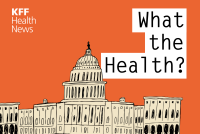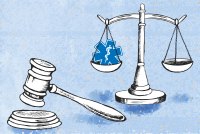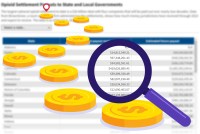Latest Morning Briefing Stories
Too Big To Fail? Now It’s ‘Too Big To Hack’
Congress this week had the chance to formally air grievances over the cascading consequences of the Change Healthcare cyberattack, and lawmakers from both major parties agreed on one culprit: consolidation in health care. Plus, about a year after states began stripping people from their Medicaid rolls, a new survey shows nearly a quarter of adults who were disenrolled are now uninsured. Jessie Hellmann of CQ Roll Call, Sarah Karlin-Smith of the Pink Sheet, and Lauren Weber of The Washington Post join KFF Health News’ Mary Agnes Carey to discuss these stories and more. Also this week, KFF Health News’ Julie Rovner interviews Caroline Pearson of the Peterson Health Technology Institute.
Conservative Justices Stir Trouble for Republican Politicians on Abortion
Republicans are learning the admonition “be careful what you wish for,” as conservative judges cause them political problems over abortion in a crucial election year.
Lawsuit Alleges Obamacare Plan-Switching Scheme Targeted Low-Income Consumers
The lawsuit filed in federal court alleges that large call centers were used to enroll people into Affordable Care Act plans or to switch their coverage, all without their permission.
Swap Funds or Add Services? Use of Opioid Settlement Cash Sparks Strong Disagreements
The national opioid settlements don’t prohibit using money for initiatives already supported by other means, but doing so could dilute the impact.
KFF Health News' 'What the Health?': Arizona Turns Back the Clock on Abortion Access
A week after the Florida Supreme Court said the state could enforce an abortion ban passed in 2023, the Arizona Supreme Court ruled that state could enforce a near-total ban passed in 1864 — over a half-century before Arizona became a state. The move further scrambled the abortion issue for Republicans and posed an immediate quandary for former President Donald Trump, who has been seeking an elusive middle ground in the polarized debate. Alice Miranda Ollstein of Politico, Rachel Cohrs Zhang of Stat, and Rachel Roubein of The Washington Post join KFF Health News’ Julie Rovner to discuss these stories and more. Also this week, Rovner interviews KFF Health News’ Molly Castle Work, who reported and wrote the latest KFF Health News-NPR “Bill of the Month” feature, about an air-ambulance ride for an infant with RSV that his insurer deemed not medically necessary.
California Fails to Adequately Help Blind and Deaf Prisoners, US Judge Rules
Thirty years after prisoners with disabilities sued and 25 years after a federal court first ordered accommodations, a judge found that California prison and parole officials still are not doing enough to help deaf and blind prisoners — in part because they are not providing readily available technology such as video recordings and laptop computers.
KFF Health News' 'What the Health?': Florida Limits Abortion — For Now
The Florida Supreme Court handed down dual abortion rulings this week. One said voters will be allowed to decide in November whether to create a state right to abortion. The other ruling, though, allows a 15-week ban to take effect immediately — before an even more sweeping, six-week ban replaces it in May. Meanwhile, President Joe Biden is doubling down on his administration’s health care accomplishments as he kicks off his general election campaign. Lauren Weber of The Washington Post, Joanne Kenen of the Johns Hopkins University schools of nursing and public health, and Tami Luhby of CNN join KFF Health News’ Julie Rovner to discuss these stories and more. Also this week, Rovner interviews health care analyst Jeff Goldsmith about the growing size and influence of UnitedHealth Group in the wake of the Change Healthcare hack.
Track Opioid Settlement Payouts — To the Cent — In Your Community
Want to know how much opioid settlement money your city, county, or state has received so far? Or how much it’s expecting in the future? Use our new searchable database to find out.
KFF Health News' 'What the Health?': The Supreme Court and the Abortion Pill
The Supreme Court this week heard its first abortion case since overturning Roe v. Wade in 2022, about an appeals court ruling that would dramatically restrict the availability of the abortion pill mifepristone. But while it seems likely that this case could be dismissed on a technicality, abortion opponents have more challenges in the pipeline. Meanwhile, health issues are heating up on the campaign trail, as Republicans continue to take aim at Medicare, Medicaid, and the Affordable Care Act — all things Democrats are delighted to defend. Alice Miranda Ollstein of Politico, Sarah Karlin-Smith of the Pink Sheet, and Lauren Weber of The Washington Post join KFF Health News chief Washington correspondent Julie Rovner to discuss these issues and more. Also this week, Rovner interviews KFF Health News’ Tony Leys, who wrote a KFF Health News-NPR “Bill of the Month” feature about Medicare and a very expensive air-ambulance ride. Plus, for “extra credit,” the panelists suggest health policy stories they read this week they think you should read, too.
At Stake in Mifepristone Case: Abortion, FDA’s Authority, and Return to 1873 Obscenity Law
The end goal for a conservative Christian group’s mifepristone case before the Supreme Court: a de facto nationwide abortion ban.











